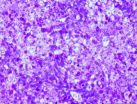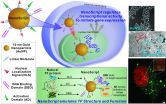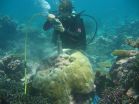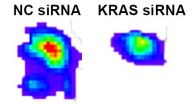Enterotoxigenic E. coli worldwide are closely related
2014-11-13
(Press-News.org) The strains of enterotoxigenic Escherichia coli (ETEC) that infect adults and children in Asia, Africa, and the Americas, have notably similar toxins and virulence factors, according to research published ahead of print in the Journal of Bacteriology. That bodes well for vaccine development, says corresponding author Åsa Sjöling, now of the Karolinska Institutet, Stockholm, Sweden. ETEC infects 400 million people annually, or 5.3 percent of the world's population, killing 400,000.
In the study, Sjöling et al. set out to determine whether the heat labile toxin (LT) had become more toxic over time, and whether the bacterium had evolved to secrete more of it. LT causes the "travelers' diarrhea" that so frequently afflicts Americans abroad, and that plagues residents of many low and middle income countries. But they found that over the 30 year period from which they had isolates, the two most potent toxin types, LT1 and LT2, had changed little but had spread globally.
"When new ETEC strains acquire either LT1 or LT2 they seem to have a much better chance to persist and spread," says Sjöling. Colonization factors, the compounds the bacterium uses to adhere to the lining of the human got, also remained conserved over time, and the most common colonization factors identified globally were often associated with LT1 and LT2.
The research results from a collaboration between the University of Gothenburg (where Sjöling did this research), which has the world's largest collection of ETEC strains, and sequencing experts at the Sanger Institute, Cambridge, UK. "We soon saw that strains with similar toxin variants and colonization factor profiles often remained closely related despite having been isolated on different continents, with time spans between those isolations ranging up to 30 years," says Sjöling.
The paper is published concurrently with a paper in Nature Genetics by many of the same authors. In that paper, investigators developed whole-genome sequence data for 362 ETEC strains over 30 years, in 20 countries. "This research strengthens our belief that it is possible to target a broad range of ETEC groups with one vaccine," says Gordon Dougan of the Sanger Institute, a coauthor of both papers.
"We believe that the vaccine developed at the University of Gothenburg will be protective and useful globally since this vaccine is based on the toxin types and colonization factors we found to be most successful worldwide," says Sjöling.
While ETEC was believed to vary widely from place to place, the Nature Genetics investigators traced many of the 21 lineages to an individual bacterium that acquired the genetic information needed to infect humans between 51 and 174 years ago, and then spread. That, in turn, suggests that the bacterium is stable, and that it is unlikely to become vaccine-resistant, and that the vaccine will be effective worldwide in both children and adults, says Sjöling.
INFORMATION:
Journal of Bacteriology is a publication of the American Society for Microbiology (ASM). The ASM is the largest single life science society, composed of over 39,000 scientists and health professionals. Its mission is to advance the microbiological sciences as a vehicle for understanding life processes and to apply and communicate this knowledge for the improvement of health and environmental and economic well-being worldwide.
ELSE PRESS RELEASES FROM THIS DATE:
2014-11-13
Frightening experiences do not quickly fade from memory. A team of researchers under the guidance of the University of Bonn Hospital has now been able to demonstrate in a study that the bonding hormone oxytocin inhibits the fear center in the brain and allows fear stimuli to subside more easily. This basic research could also usher in a new era in the treatment of anxiety disorders. The study has already appeared in advance online in the journal "Biological Psychiatry". The print edition will be available in a few weeks.
Significant fear becomes deeply entrenched in memory. ...
2014-11-13
The liver stores excess glucose, sugar, in the form of glycogen--chains of glucose--, which is later released to cover body energy requirements. Diabetic patients do not accumulate glucose well in the liver and this is one of the reasons why they suffer from hyperglycemia, that is to say, their blood sugar levels are too high. A study headed by Joan J. Guinovart at the Institute for Research in Biomedicine (IRB Barcelona) demonstrates that high hepatic glucose stores in mice prevents weigh gain. The researchers observed that in spite of having free access to an appetizing ...
2014-11-13
PISCATAWAY, N.J. (November 13, 2014) - Rutgers University Chemistry Associate Professor Ki-Bum Lee has developed patent-pending technology that may overcome one of the critical barriers to harnessing the full therapeutic potential of stem cells.
One of the major challenges facing researchers interested in regenerating cells and growing new tissue to treat debilitating injuries and diseases such as Parkinson's disease, heart disease, and spinal cord trauma, is creating an easy, effective, and non-toxic methodology to control differentiation into specific cell lineages. ...
2014-11-13
(Boston) - The Alzheimer's drug memantine may perform double-duty helping binge eaters control their compulsion. Researchers have demonstrated that memantine, a neuroprotective drug, may reduce the addictive and impulsive behavior associated with binge eating.
The Boston University School of Medicine (BUSM) study, which appears online in Neuopsychopharmacology, also found that a specific area in the brain, the nucleus accumbens, which is responsible for addictive behaviors, facilitates the effects of memantine.
Binge-eating disorder is a prevalent illness in America, ...
2014-11-13
The Earth's oceans are thought to have taken up about one quarter of the carbon dioxide (CO2) that humans pumped into the atmosphere in the past 2 decades. While this drives acidification and has consequences for sea life, it also moderates the rate of climate change.
Researchers recently set out to create a global model of CO2 uptake using fine-scale observations on a global scale. Between 1998 and 2011, they found strong interannual variations, with the Pacific Ocean dominating the global flux variability.
"Shipboard surface water CO2 measurements are the backbone ...
2014-11-13
The ocean is warming steadily and setting up the conditions for stronger El Niño weather events, a new study has shown.
A team of US, Australian, and Canadian researchers sampled corals from a remote island in Kiribati to build a 60-year record of ocean surface temperature and salinity.
"The trend is unmistakeable, the ocean's primed for more El Niño events," says lead-author Dr Jessica Carilli, now based at the University of Massachusetts, Boston.
Team member Dr Helen McGregor from the Research School of Earth Sciences at The Australian National University ...
2014-11-13
HOUSTON - (Nov. 13, 2014) - While feelings of disgust can increase behaviors like lying and cheating, cleanliness can help people return to ethical behavior, according to a recent study by marketing experts at Rice University, Pennsylvania State University and Arizona State University. The study highlights the powerful impact emotions have on individual decision-making.
"As an emotion, disgust is designed as a protection," said Vikas Mittal, the J. Hugh Liedtke Professor of Marketing at Rice's Jones Graduate School of Business. "When people feel disgusted, they tend to ...
2014-11-13
Half a million objects, including debris, satellites, and the International Space Station, orbit the planet in the thermosphere, the largest layer of Earth's atmosphere. To predict the orbits--and potential collisions--of all this stuff, scientists must forecast the weather in the thermosphere.
Researchers who analyzed the role that gravitational effects of the Moon have on the thermosphere found that satellites taking different paths around the planet--circling over the poles, around the equator, or any route in between--will experience different levels of lunar-induced ...
2014-11-13
CHAPEL HILL, NC - Researchers from the UNC School of Medicine and colleagues at The University of Texas MD Anderson Cancer Center have developed a new approach to block the KRAS oncogene, one of the most frequently mutated genes in human cancer. The approach, led by Chad Pecot, MD, an assistant professor of medicine at UNC, offers another route to attack KRAS, which has proven to be an elusive and frustrating target for drug developers.
The new method relies upon a specifically sequenced type of small interfering RNA - or siRNA. The findings, published in the journal ...
2014-11-13
Irvine, Calif., Nov. 13, 2014 -- A new bloodstream infection test created by UC Irvine researchers can speed up diagnosis times with unprecedented accuracy, allowing physicians to treat patients with potentially deadly ailments more promptly and effectively.
The UCI team, led by Weian Zhao, assistant professor of pharmaceutical sciences, developed a new technology called Integrated Comprehensive Droplet Digital Detection. In as little as 90 minutes, IC 3D can detect bacteria in milliliters of blood with single-cell sensitivity; no cell culture is needed.
The work appears ...
LAST 30 PRESS RELEASES:
[Press-News.org] Enterotoxigenic E. coli worldwide are closely related



